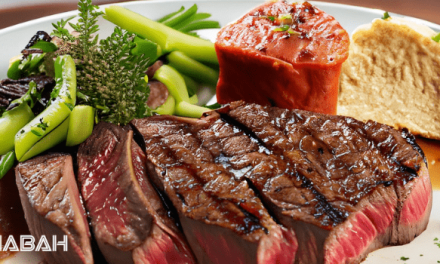Islam provides clear guidelines on what foods are permitted (halal) and prohibited (haram) for Muslims to consume. The criteria for whether a food is halal is based on several factors:
- The source of the food (e.g. pork is haram)
- The method of slaughter (e.g. zabiha)
- General principles from Quranic verses and hadith
One food that has recently prompted much debate in the Muslim community is kangaroo meat:
Kangaroo meat is growing in popularity globally for its nutritional qualities and environmental sustainability. (source)
However, there are conflicting views on whether kangaroo meat is allowed under Islamic dietary laws:
- Some argue it is halal
- Others say it is haram
- Some conclude it is inconclusive
This article will analyze the evidence and perspectives on both sides of the debate over the halal status of kangaroo meat according to Islamic principles and scholarship.
Background on Kangaroos
Kangaroos are indigenous animals found in the wild across Australia and some neighboring islands. Here are some key facts about kangaroos:
-
They are herbivorous marsupial mammals that are part of the Macropodidae family:
“Kangaroos are herbivorous mammals that belong to the family Macropodidae.” (source)
-
There are over 50 different species of kangaroos including the well-known Red Kangaroo and Grey Kangaroo.
-
Females have a pouch for carrying their young called joeys.
-
Kangaroos are hunted in the wild for their meat and hides.
-
In the late 1960s, a commercial kangaroo meat industry was established in Australia:
“Kangaroo harvesting is one of Australia’s sustainably managed wild-harvest industries. It is harvested from wild, free-range animals for local and overseas markets.” (source)
-
Today kangaroo meat is exported to over 55 countries around the world.
The question around kangaroos relates to whether their meat is permitted for consumption by Muslims according to Islamic rulings.
Differing Perspectives on Kangaroo’s Halal Status
There are several contrasting viewpoints on whether kangaroo meat is halal or haram:
Arguments that Kangaroo is Halal
Some of the evidence used to argue that kangaroo is halal includes:
-
Kangaroos are herbivores that do not eat meat or carrion:
“Kangaroos are herbivorous animals that eat grass and plants only.” (source)
-
Kangaroos are not mentioned specifically as a prohibited animal in the Quran or Sunnah.
-
Kangaroo meat has been certified as halal by halal certifiers in Australia and Turkey:
“Turkey’s top religious body said it categorizes kangaroo meat as halal.” (source)
Arguments that Kangaroo is Haram
On the other hand, some reasons used to argue kangaroo is haram include:
-
Uncertainty whether kangaroos are slaughtered properly according to zabiha requirements
-
Kangaroos were likely not present in Arabia during the Prophet’s time, so their status is unknown
-
Opinion that meat of wild animals or game is haram by default
Inconclusive Opinions
Some conclude there is insufficient evidence to definitively declare kangaroos as halal or haram:
- Differences in opinion between schools of Islamic law (madhabs)
- Need for further analysis and consensus from scholars
Analysing Q&A sites on kangaroo meat
- Several users stated that kangaroo meat should be halal since kangaroos are herbivorous animals that do not eat meat or carrion. Their diet of grass and plants aligns with Islamic dietary laws.
- Some pointed out that there are no specific prohibitions against kangaroo meat in the Quran or hadiths.
- Others argued that because kangaroos are wild animals, there is uncertainty around whether they can be slaughtered properly according to zabiha requirements. This could potentially make their meat haram.
- A few users highlighted differences in opinion between Islamic schools of thought, with some declaring it halal and others haram. This reflects the lack of consensus on this issue.
- One user noted that since kangaroos were not present in Arabia during the Prophet Muhammad’s time, their status is quite ambiguous in classical Islamic jurisprudence.
- Overall, Quora opinions seem to mirror the broader debate, with reasonable cases made both for and against considering kangaroo halal, as well as many inconclusive viewpoints.
In summary, there does not appear to be any clear consensus on the halal status of kangaroo among Quora users at this time. Opinions remain mixed.
FAQ: Is kangaroo halal to eat?
Kangaroo meat is a topic of discussion within the Islamic community regarding its permissibility for consumption according to Islamic dietary laws. Let’s explore this further.
Is kangaroo halal Hanafi?
According to the renowned Hanafi jurist Imam al-Mawsuli, the default ruling is that things are permissible (halal) unless there is evidence establishing their prohibition. Therefore, as a general principle, land animals with flowing blood that survive on grass and leaves, and do not prey on other animals, are considered halal for consumption.
Since kangaroos are land mammals with flowing blood that only eat plants, and there is no clear textual evidence prohibiting their consumption in the Quran or Sunnah, it can be concluded that kangaroo meat is halal for Muslims to eat according to the Hanafi school of thought. Imam al-Mawsuli’s position indicates that kangaroos would be permitted, as they meet the criteria of halal land animals absent any direct prohibition.
In summary, based on the Hanafi methodology of jurisprudence and its emphasis on lack of prohibitive evidence, there is a sound basis to declare that kangaroo meat is halal for Muslims according to the Hanafi madhhab. This remains the stance of many Hanafi scholars and bodies, unless new evidence emerges requiring reconsideration.
What is the basis for its prohibition?
The classification of animals as halal or haram (forbidden) in Islam is based on specific guidelines mentioned in the Quran and Hadith (teachings and practices of the Prophet Muhammad, peace and blessings be upon him).
Are there any fatwas regarding kangaroo meat?
The religious affairs directorate of certain Islamic countries, such as Diyanet’s High Committee of Religious Affairs, have issued fatwas stating that kangaroo meat is halal to consume. However, other Islamic scholars disagree.
What do Islamic scholars say about kangaroo meat?
Islamic scholars who consider kangaroo meat halal argue that kangaroos are clean animals like deer, also classified as halal. They survive on grass and leaves and do not prey on other animals.
Is there any prohibition mentioned in the Quran or Hadith?
Specific references to kangaroo meat are not found in the Quran or Hadith. The prohibition of certain animals, such as donkey, is mentioned, but kangaroos are not classified in the same category.
What are the conditions for making kangaroo meat halal?
Those who argue for the permissibility of kangaroo meat suggest that it should be slaughtered using Islamic slaughtering methods, known as “halal slaughter.” However, others disagree and consider kangaroo meat haram.
What are the opinions of Islamic authorities on this matter?
The opinions of Islamic authorities vary. Some argue that kangaroo meat can be consumed based on the principles of halal food, while others believe it is not permissible according to Islamic dietary laws.
Is Kangaroo Meat Halal and Permissible in Islam
In summary, there are reasonable points made on both sides of the debate about whether kangaroo meat is permissible for Muslims:
-
Those arguing it is halal present evidence like kangaroos being herbivores and certified halal in some countries.
-
Those arguing it is haram point out potential issues with slaughter method and lack of clear approval.
-
Others highlight the lack of definitive evidence either way:
“Based on the above, the issue of kangaroo meat is something that does not have definitive evidence to clearly state whether it is Halaal or Haraam.” (source)
More analysis and consensus from Islamic scholars is needed, though opinions currently vary among Muslim communities and madhahib.
In conclusion, there are reasonable arguments on both sides of the debate on the halal status of kangaroo meat. While some permit it, others prohibit it, and many remain uncertain without a clear consensus.





